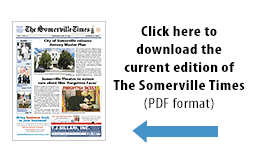
Invasive species displaces native plants and is toxic to local wildlife
With gardening season in full swing, the City of Somerville is asking community members to help stop the spread of Black Swallow-Wort (BSW).
What is Black Swallow-Wort?
BSW is a fast-spreading, non-native plant that crowds out native species, disrupts natural habitats, and poses serious risks to butterflies, birds, deer, and even livestock. Pollinators like monarch butterflies are at great risk because they often mistake BSW for milkweed plants relied on for reproduction. When monarchs lay their eggs on BSW, their larvae hatch and feed on its toxic leaves, only to die shortly after.
BSW appears across Somerville, and we need your help to remove it.
How to Identify BSW
- Leaves: Shiny, dark green, and arranged in pairs along twining vines—often seen wrapping around fences and shrubs.
- Flowers: Small, dark purple blooms with five petals and a green center, appearing in early summer.
- Pods: Slim, green seed pods begin forming in June. These MUST be removed before they turn brown and release seeds into the wind.
To download photos identifying black swallow-wort click here: Black Swallow Wort Identification
Help Stop the Spread of BSW:
- Remove It: If you spot BSW, pull up the entire plant by the roots, and dispose in a sealed trash bag. Do not compost or place in yard waste bags.
- Join a Removal Event: Connect with local groups working to preserve local biodiversity:
- Mystic River Watershed Association (mysticriver.org)
- Green & Open Somerville (greenopensomerville.org)
- Get the Word Out: Door hangers are available for pickup now through mid-July at the Somerville City Hall welcome desk (93 Highland Ave.). Please pick some up and distribute them in Somerville.
Want to learn how to do more for local pollinators? Somerville’s Pollinator Action Plan provides simple, effective ways to support bees, butterflies, and other essential species in your yard and neighborhood.
To review the plan, visit voice.somervillema.gov/somerville-pollinator-action-plan.














